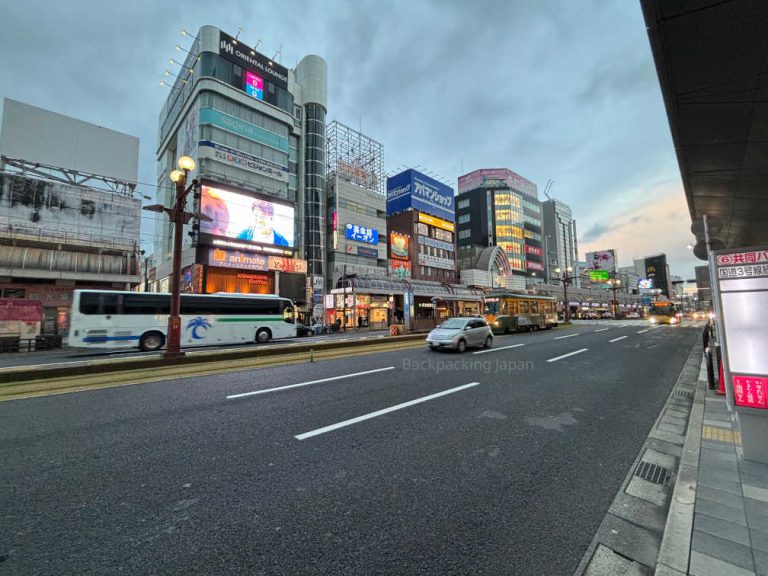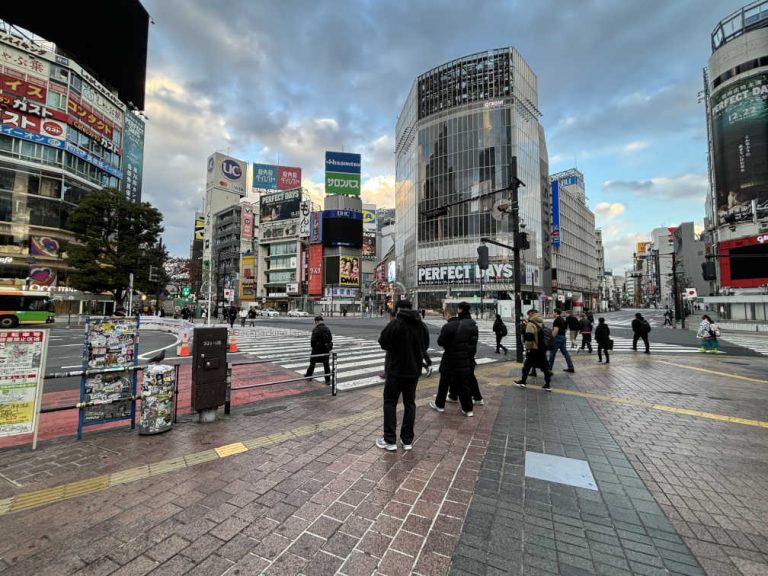35-Day City-Hopping: 2 Days in Okinawa—Naha over the New Years
Last time, we explored how I spent my buffer days when first arriving in Japan given I had no solid itinerary until I was to reach Kagoshima. This time, we’ll be exploring how I spent my time in Naha, Okinawa throughout the new year’s holidays.
Want to focus on the takeaways? Check out the Summary and Lessons Learned!
Arriving at Naha Airport
The flight between Haneda and Naha Airport takes about 3 hours. Factoring in the time to get off the plane and find my way around the airport, it took an extra half hour or so. Since I basically skipped lunch while in Tokyo, I was starving as it was also past when I normally eat dinner. Thankfully there was a noodle restaurant inside Naha airport which serves an Okinawan local specialty, Okinawa Soba.
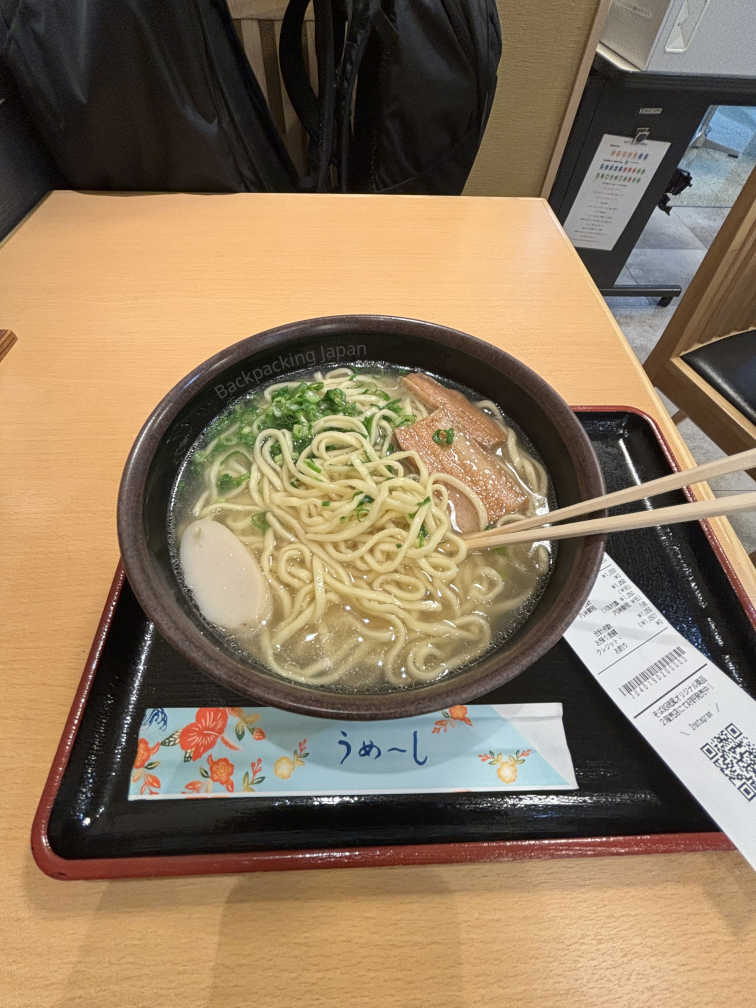
Next was to head over to the hotel. Luckily the hotel was near a monorail station, so it would be possible to take the monorail at the airport which is directly accessible from floor 2. In order to not get lost like I did, make sure you reach the outside portion of the airport (without taking any stairwells) and follow the footbridge until you reach the station.
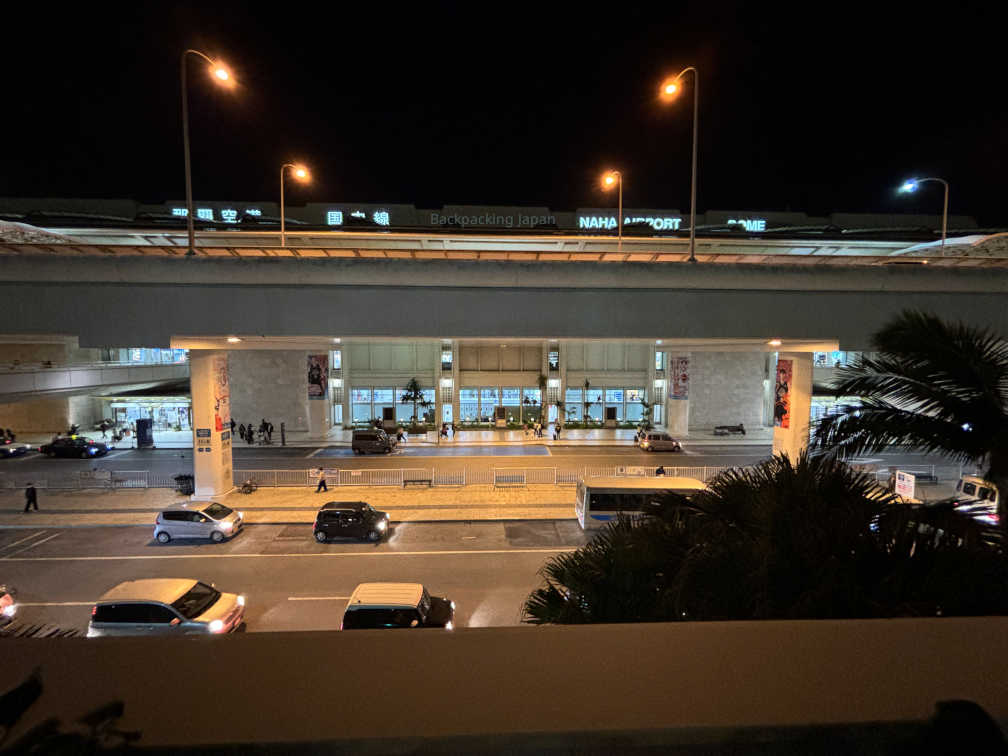
As for the hotel, I can’t recall why, but I ended up booking in Omoromachi which is about 30 minutes by monorail. For next time, I’ll be looking at booking next to Kokusai-Dori Street as the monorail takes about 15 minutes to arrive at the western end of Kokusai-Dori Street and it’s a lot closer to where I spent a lot of my time.
Despite it being December 31st, I was completely exhausted especially considering I was running on a mere 2 hours of sleep. I decided to call it a night early, so I’m not too sure what celebrations typically happen at 12:00 am on New Year’s in Naha.
January 1st
Sleeping early also meant waking up early, “but it was the 1st of January so nowhere should be open” I thought. I lied in bed for another hour or so before heading out and in hindsight it was a terrible decision as we’ll see later. Eventually, it was time for breakfast which I decided I would eat in the Kokusai-Dori area. Waiting for the monorail to come, there was a beautiful morning view from the station.
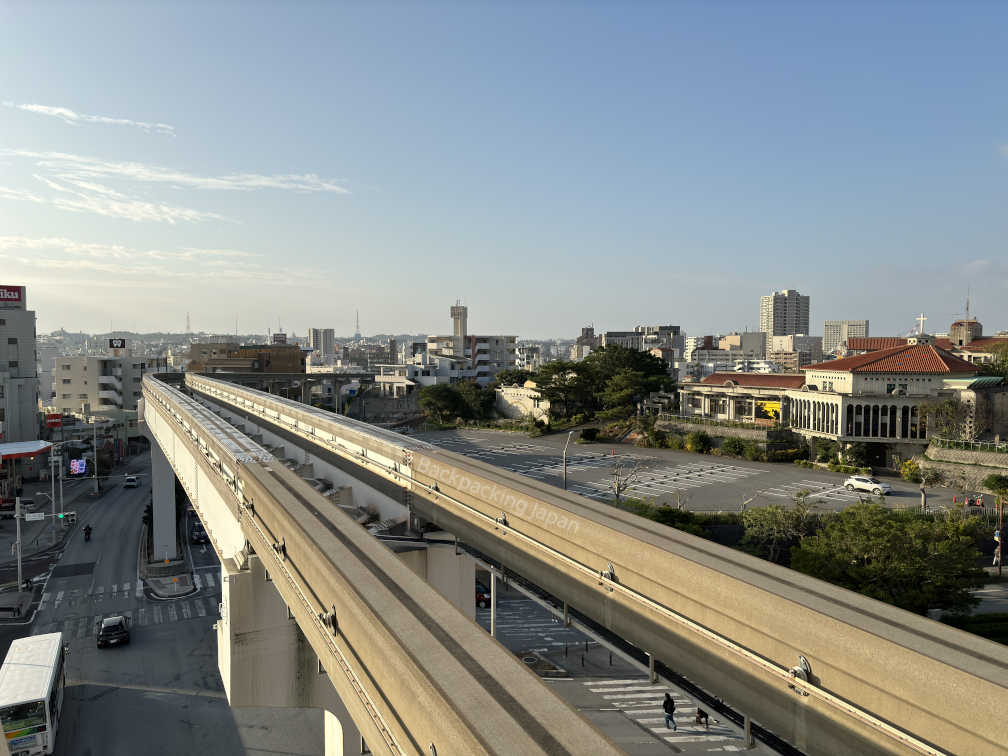
Making it to Kokusai Dori, the street was quite empty in the morning. There was this serene beauty in basically having the street to yourself while it gets basked in the morning sun.
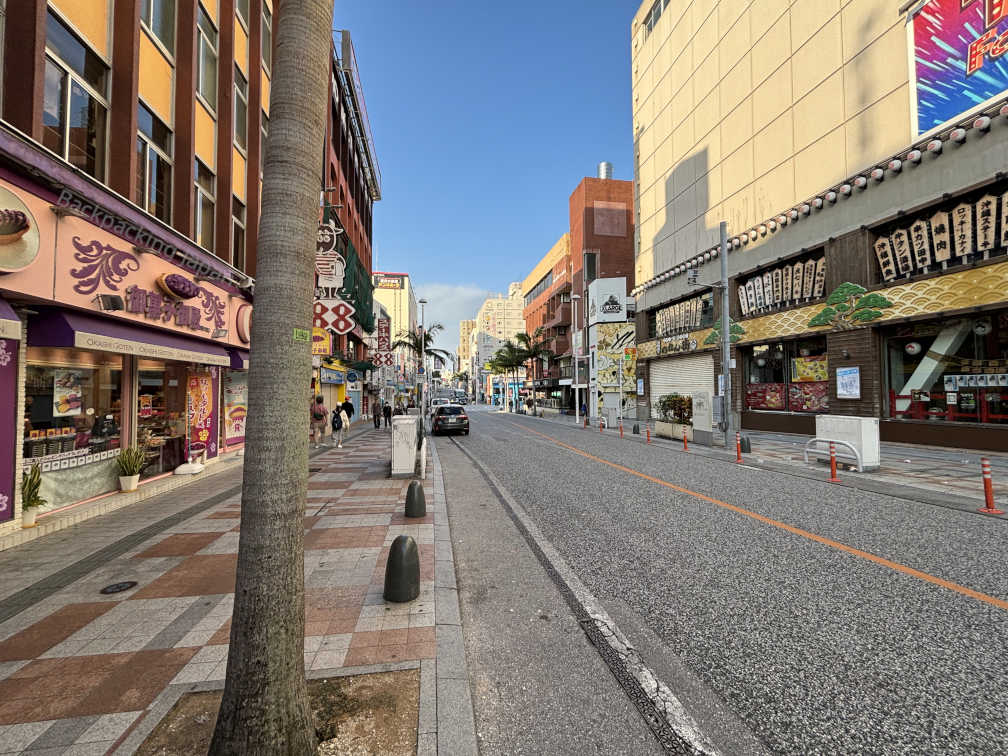
For breakfast, there was a highly rated restaurant (according to Google Maps), Pork Tamago Onigiri Makishi Market, which serves something similar to Hawaii’s Spam musubi. It was this sort of rice hotdog with egg, spam, and another local speciality, umi budo (sea grape seaweed), as the filling.
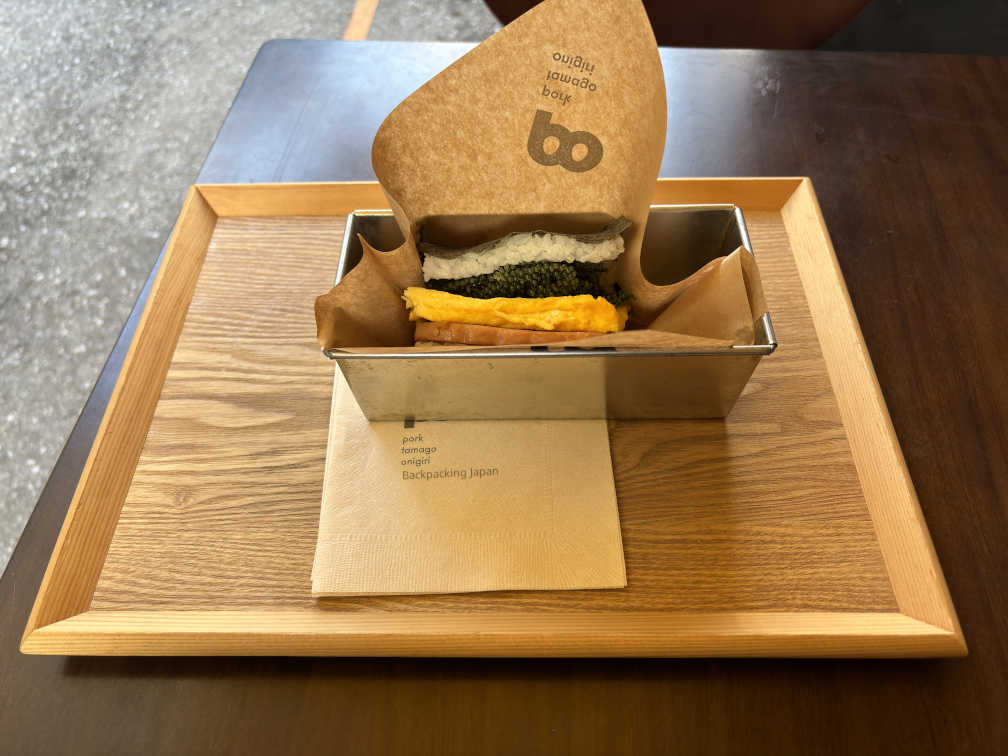
Still feeling hungry, it was time to get some more food. The umi budo was delicious, which merited trying it on its own this time. At the same time, it was an opportunity to try another local specialty, jimami dofu (peanut tofu).
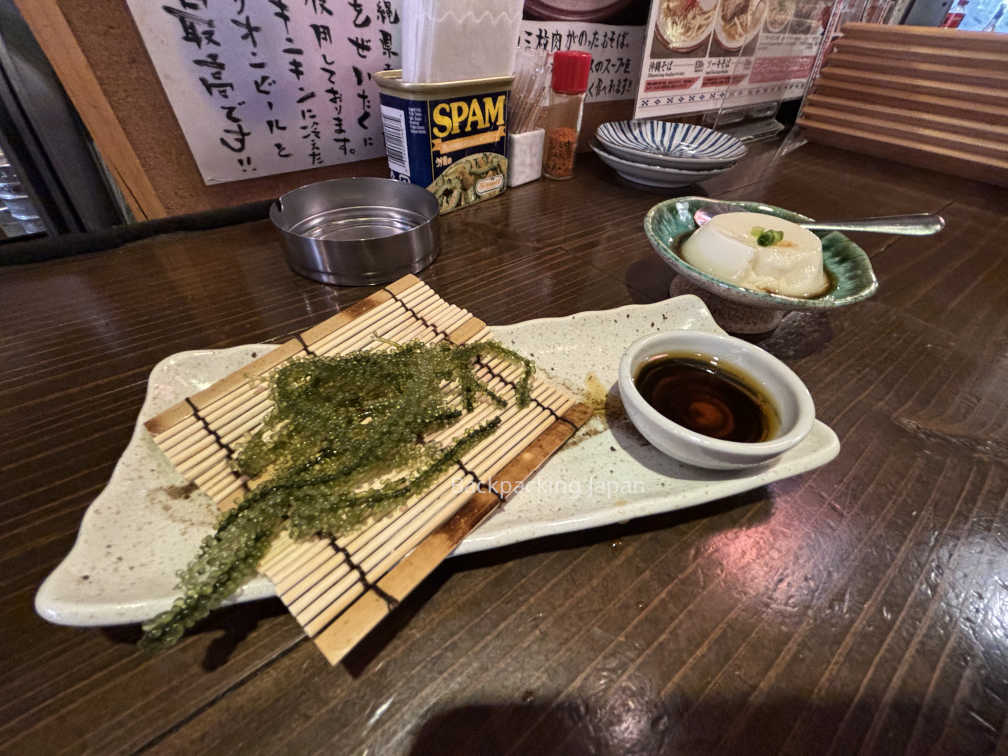
Finally feeling a bit satisfied, it was time for my first hatsumode (first shrine visit of the year) at Naminoue-gu (Naminoue Shrine). I should have kept a better track of time as it had already reached 10:30 am by the time I reached the line to enter the shrine. I was really beating myself up for not waking up earlier as the line was nearly 200 meters from the shrine and took over an hour of waiting.
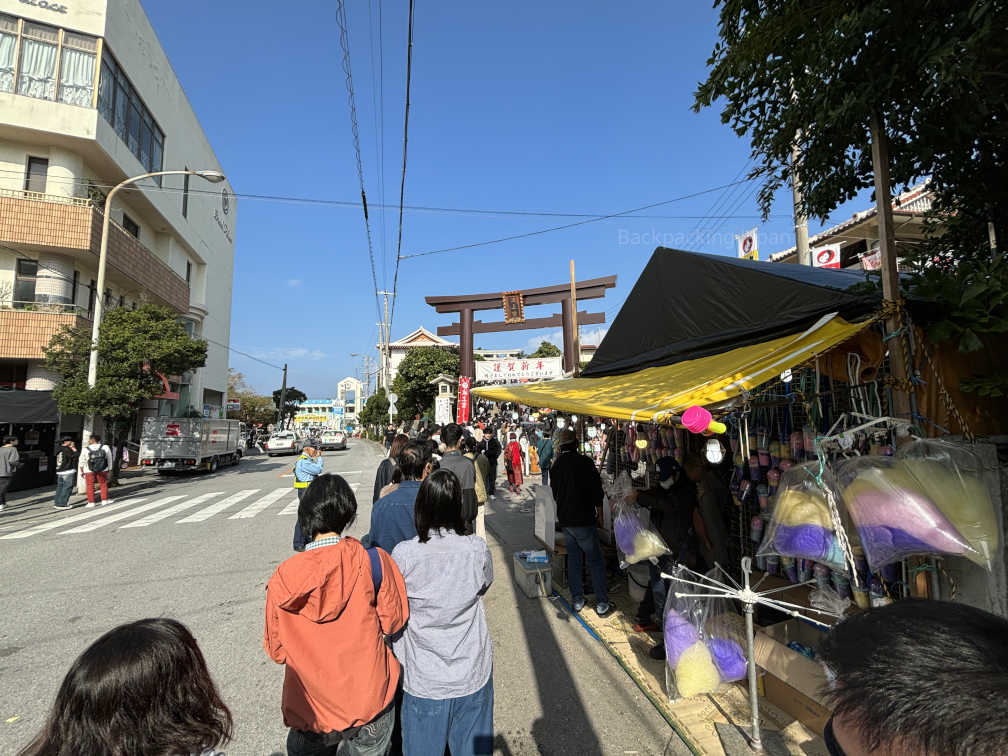
There’s a beach and a park right next to the shrine making it a nice stroll after making prayers and purchases of various charms.


Working towards the exit of the shrine, there were many stalls where it was possible to buy food or play games for prizes very similar to what’s shown in anime summer festivals. Thus it was an opportunity to try yakisoba (stir-fry noodles) for the first time.
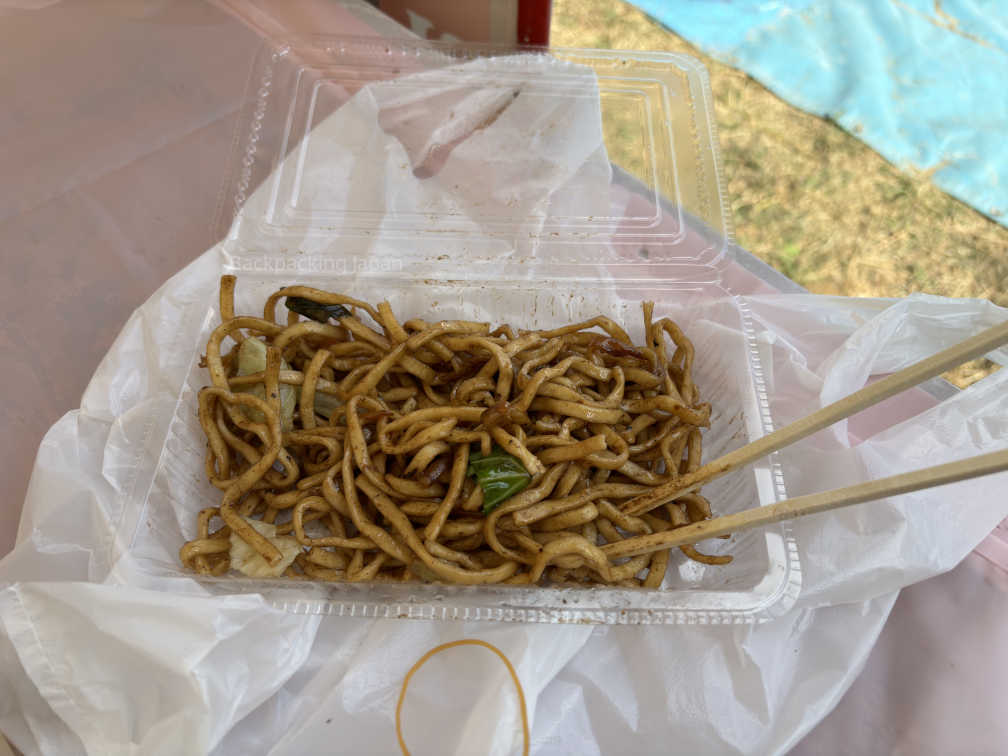
Having left the shrine, there was a dessert shop nearby that was open and sold Okinawa zenzai, shaved ice over red beans. A perfect escape from the blazing sun while being able to cool down to frozen sweets.
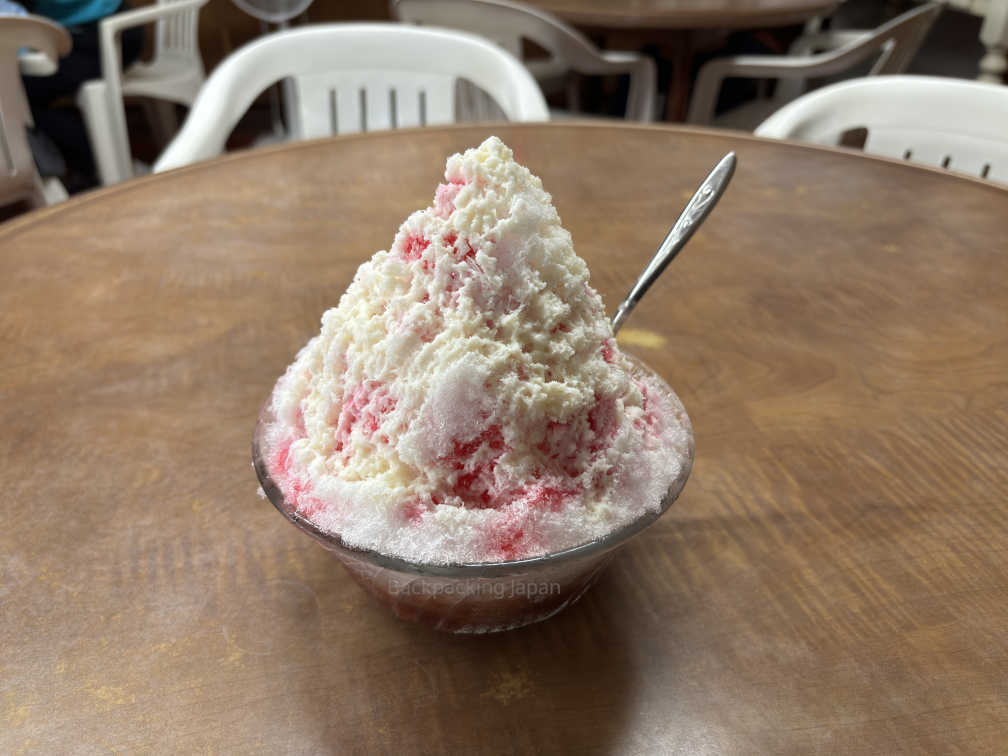
With so many people trying to visit this shrine, what would it be like at the smaller/less touristy shrines? Onoyama Park has a few shrines and seemed like a nice place to take a walk, so that was the next destination. Around the entire area, there were many stalls lined up around the park similar to what was at Naminoue Shrine. The largest shrine of the park, Okino-gu (Okino Shrine), was rather packed but the smaller shrines surrounding it saw much less traffic. One of these smaller shrines had an absolutely stunning entrance which had an even more breathtaking scene inside. What’s more is that the shrine is connected to a path along a hill which has a beautiful view over the city.
Finished with the park and shrines, Tsuboya Yachimun Street was whimsically decided to be the next location to check out. While it would’ve been faster to take public transit there, the weather was conducive for walking and was simply too nice to not enjoy. This came with the added benefit that it would’ve been possible to explore other parts of the city and get lost if something seemed interesting. Of course, this paid dividends when stumbling upon a shopping street called Sunset Naha. From afar, it was a little eerie as the entrance gate wasn’t lit up and all the stores were shuttered, but there was this inexplicable allure to go through this path. Nonetheless, it was still safe as there were a handful of elderly people passing through. Walking into the street, there was a shop that was all too familiar. Almost immediately, it clicked that the store was the taco rice restaurant Aka Tombo which appears in the RASEN in OKINAWA music video. I had never been so glad to stray off the path and get a little lost.
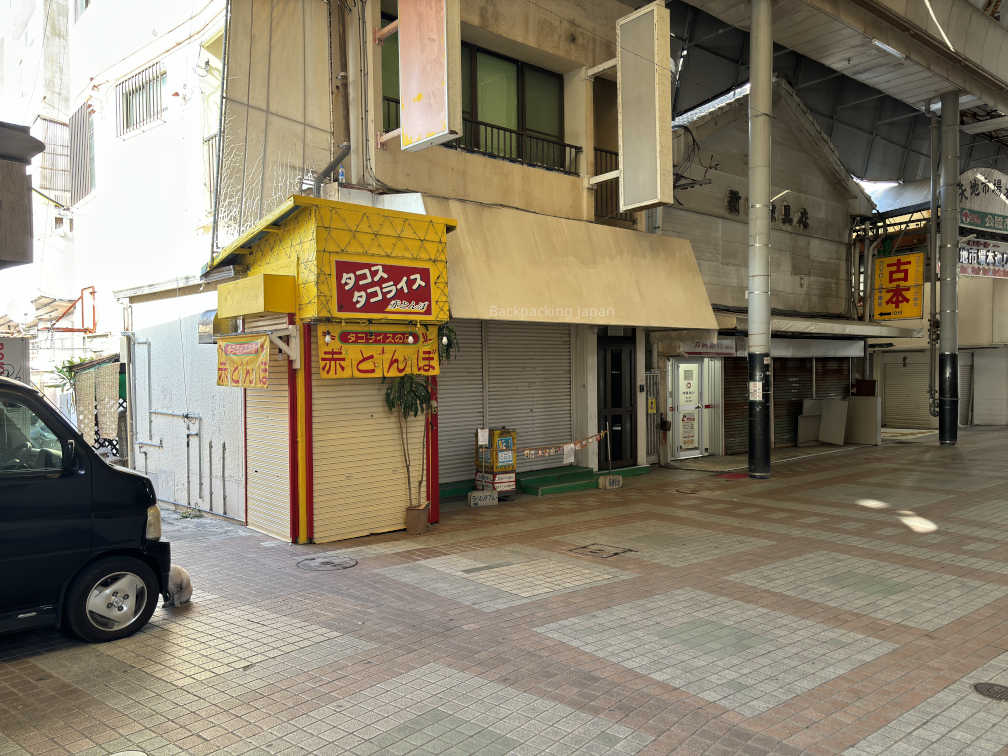
Unfortunately, it seemed to have been closed for the New Year’s holidays so I continued making my way to Tsuboya Yachimun Street. There, the street was made with cobblestone and many pottery stores which were open for business were also lined up along the street. One mistake here was not checking out the side street, Yachimun Pottery Promenade, as it seems to be very aesthetic. But that was in hindsight, and I didn’t know about this until after I had visited.
Afterwards, I decided to go check out a garden I saw on Google Maps called Fukushuen Garden. Same as before, walking instead of taking public transit. While not the fastest route, passing through the shopping arcades connected to Kokusai Dori and also walking along Kokusai Dori meant being able to see the difference between morning and afternoon. This time, there was a lot more hustle and bustle as a lot of the stores were now open.
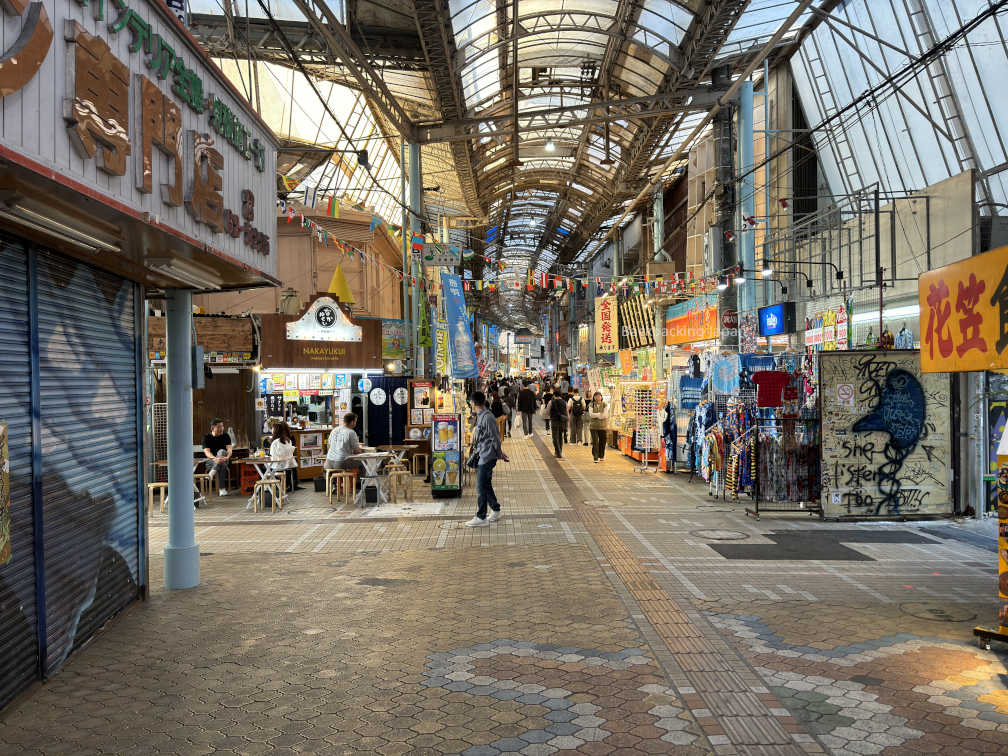
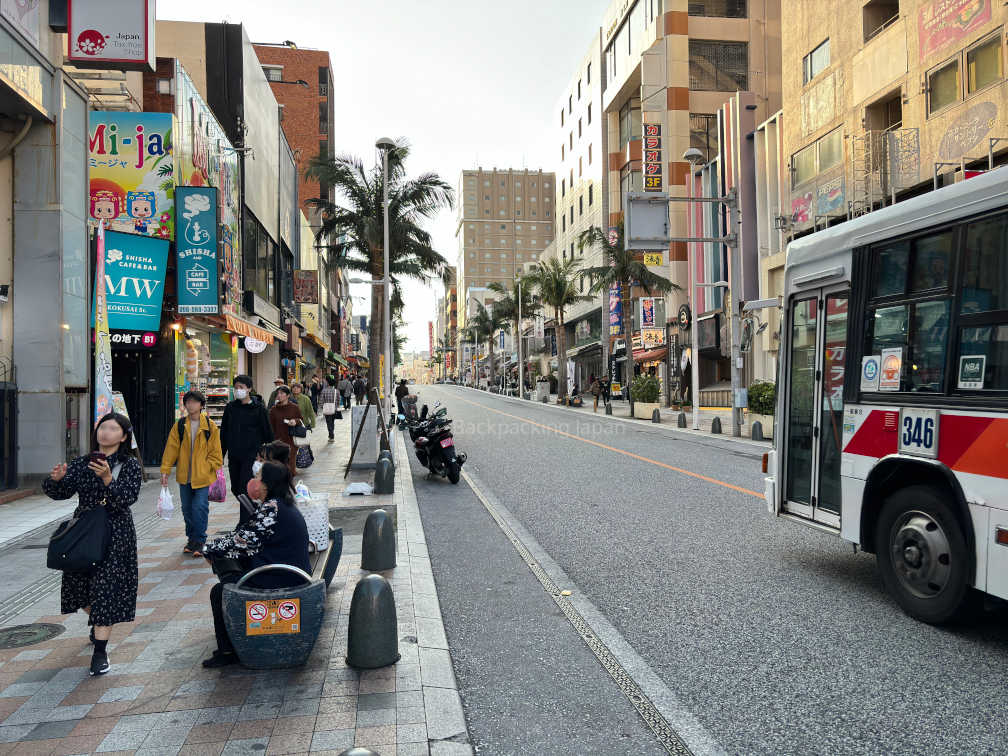
Finally arriving at the garden, there was an entrance fee of a few hundred yen.
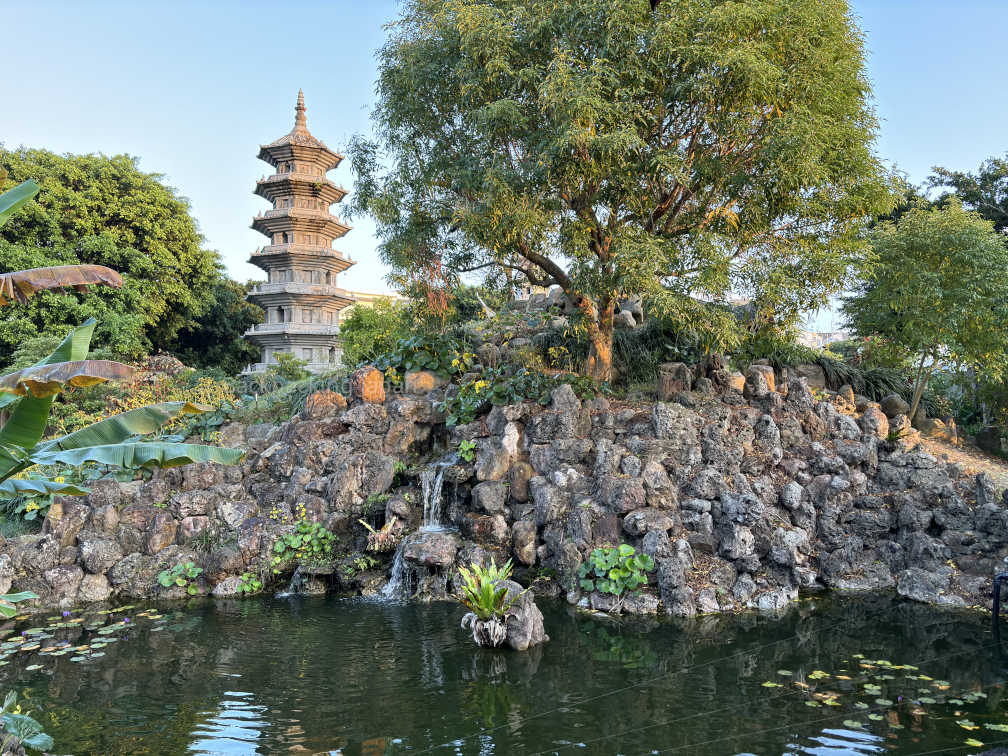
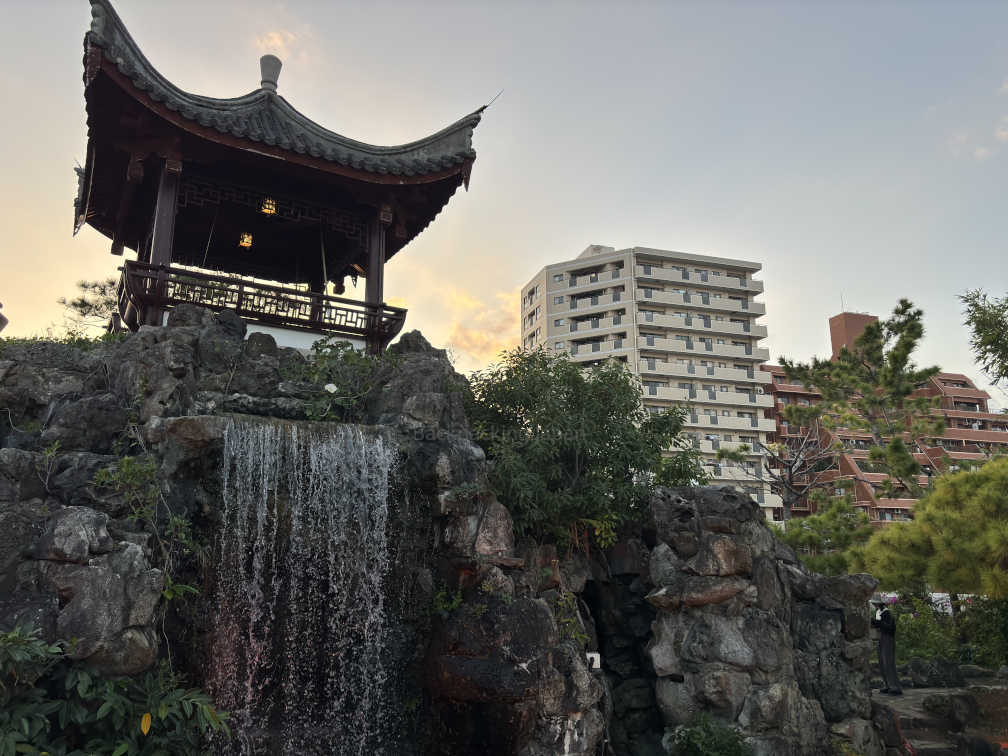
Soon enough it would be time to grab dinner. There was a restaurant near the hotel I was staying at, so I headed back. However, it turned out that a reservation would be required. Luckily they had space for tomorrow, so I made a reservation and went back to searching for a restaurant with local foods that was also open. Many of the places around the area ended up being closed so the best option was to go back to Kokusai Dori to find some place to eat there instead. It was already quite late upon arriving back at Kokusai Dori, so many shops were already at max capacity and some of the places were slowly closing. I was fortunate enough to find a sort of mom-and-pop style restaurant which had a few spaces left so I ended up eating there. With that, I learned that it’s important to make a reservation on holidays for places that are popular or where people go for special occasions. Afterwards, I went back to the hotel and called it another night
January 2nd
Having woken up fairly early, what would be a good way to spend time when Kokusai Dori doesn’t open so early, especially during the holidays, as seen yesterday? Opening up Google Maps, the large landmark icon for Shuri Castle showed up nearby. It opens at 8:00 am so just like that, the decision for how to pass the morning was made. The weather like yesterday was also great, which made for a nice walk even if it would take longer than the monorail. With no time to waste, a couple onigiris from the nearby 7-Eleven became breakfast.
Approximately 40 minutes of a walk later, the outer grounds of Shuri Castle come into view. Even though it’s merely the outer area of the castle, the perimeter has many beautiful sights to be seen whether it be from the entrance gates or the view of the city.
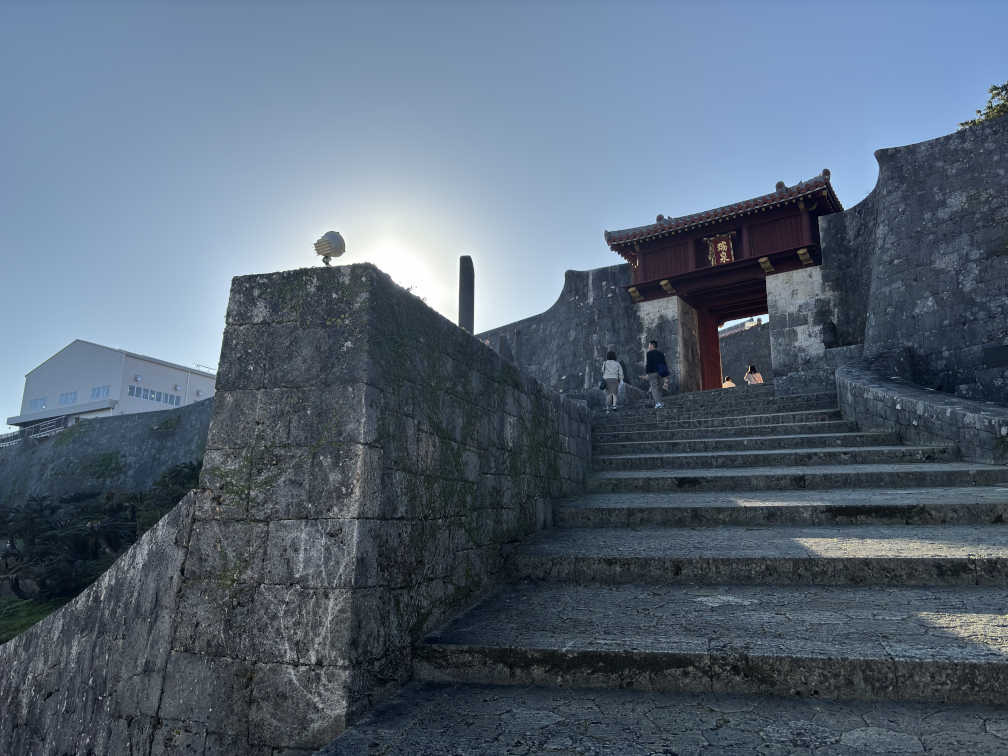
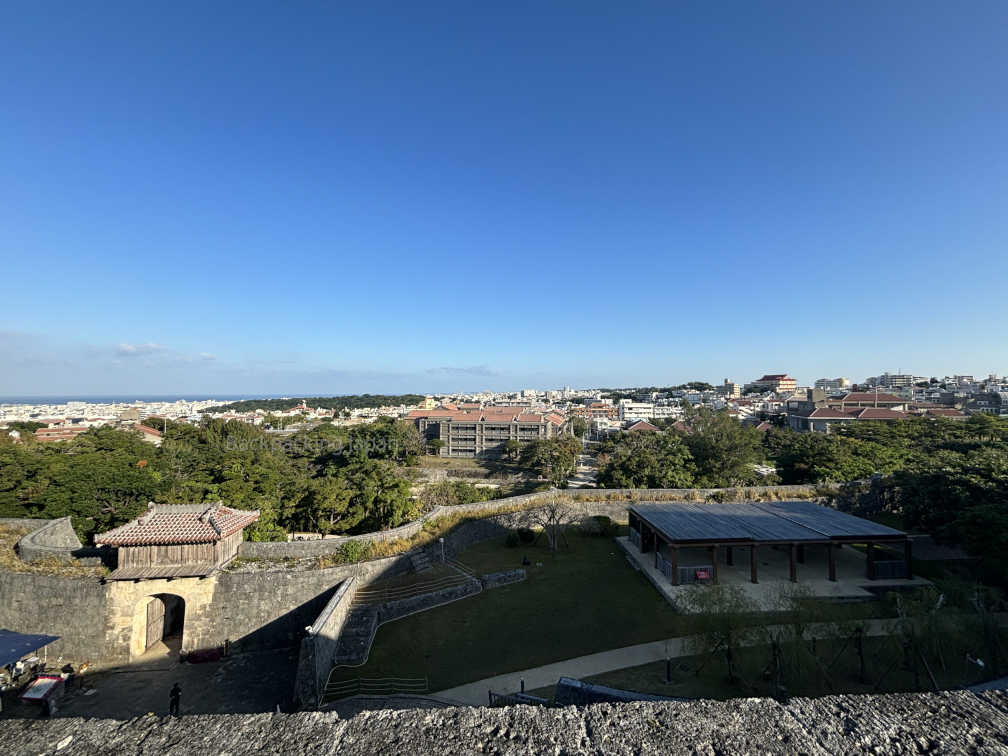
At the main entrance to the castle, another surprise was awaiting. It turned out that Shuri Castle was one of the locations from the RASEN in OKINAWA music video!
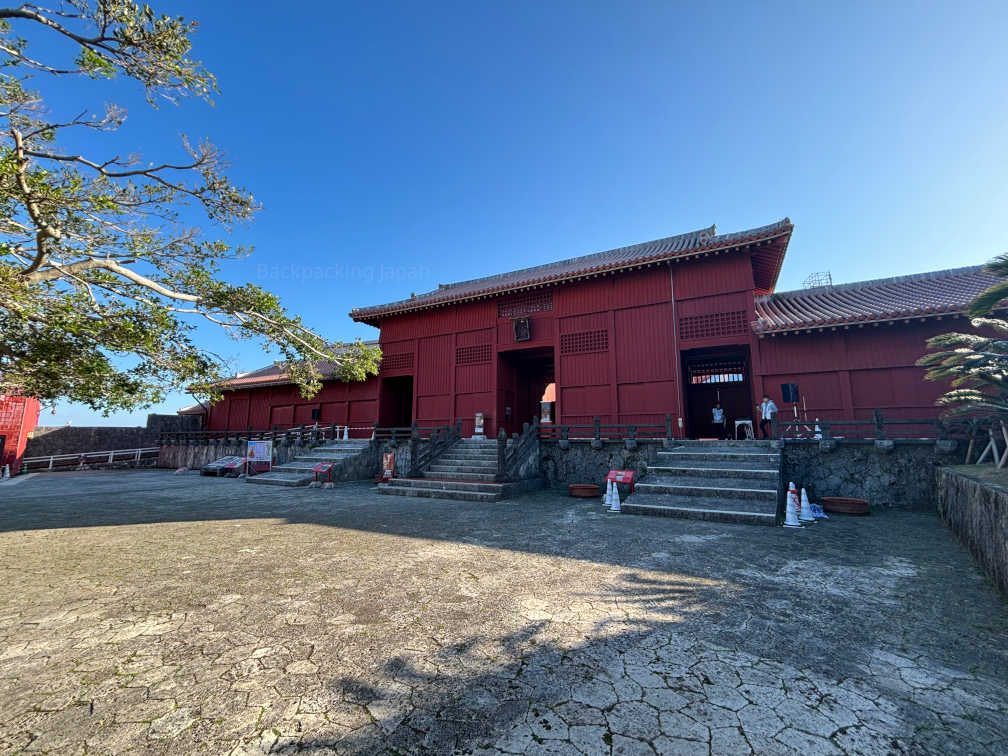
After touring the castle and learning about the rebuilding efforts due to a fire which burned the entire building down, I was also able to piece together that this was likely what the intro of the RASEN in OKINAWA video was portraying. It’s these random discoveries and connecting of dots that make a trip that much more magical.
Having completed the route of the paid area, it was back to the outer perimeter of the castle which still had more spots to explore.
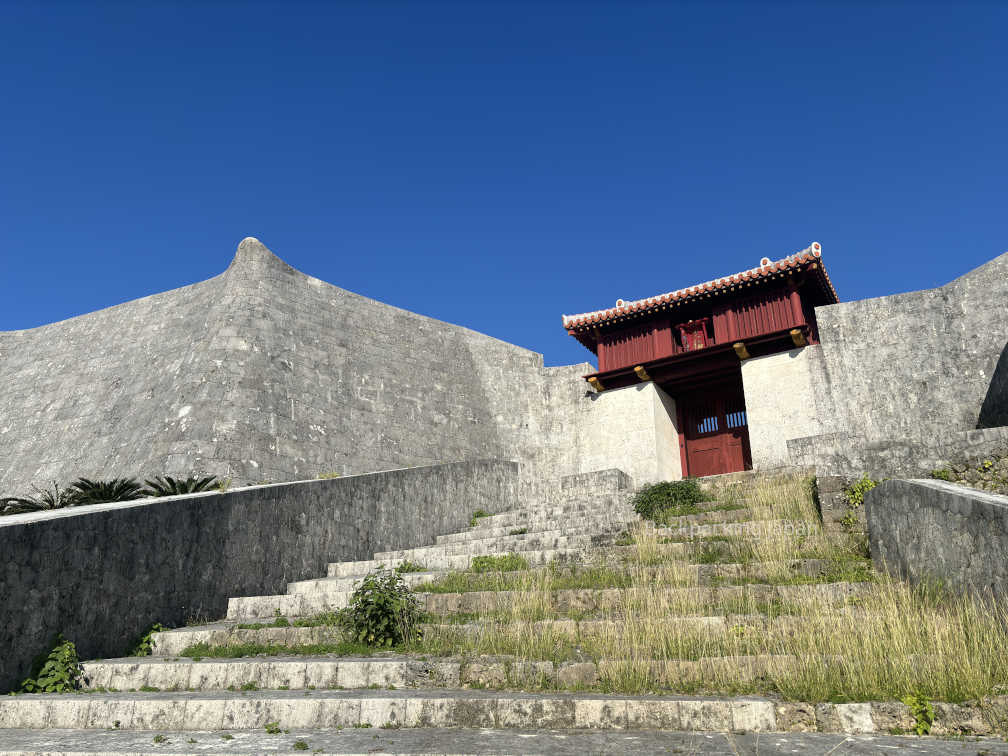
After having finished making the rounds, one shocking discovery was that the entrance had become crowded! It was only 10:30 am but the number of people had grown exponentially! In comparison, it was slightly before 9:30 am when I had originally arrived but there was virtually nobody there at the time! For this reason, I’ve made a note to myself to only visit early if I decide to go back there again.
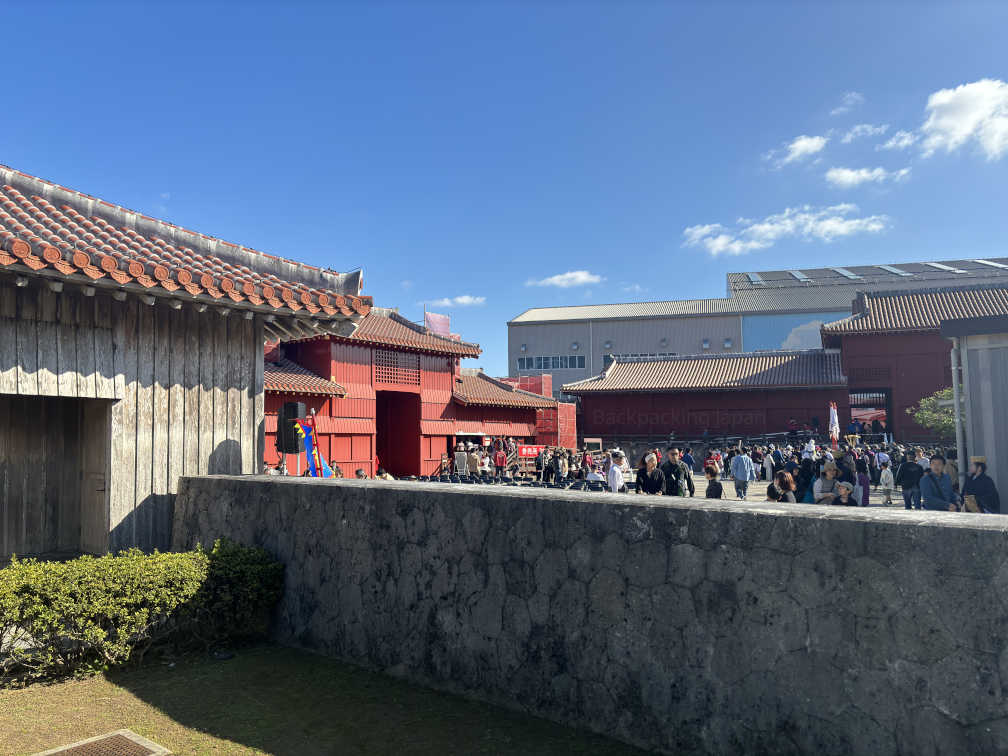
To conclude the visit to Shuri Castle, a quick visit to the neighboring Tama-udun tomb.
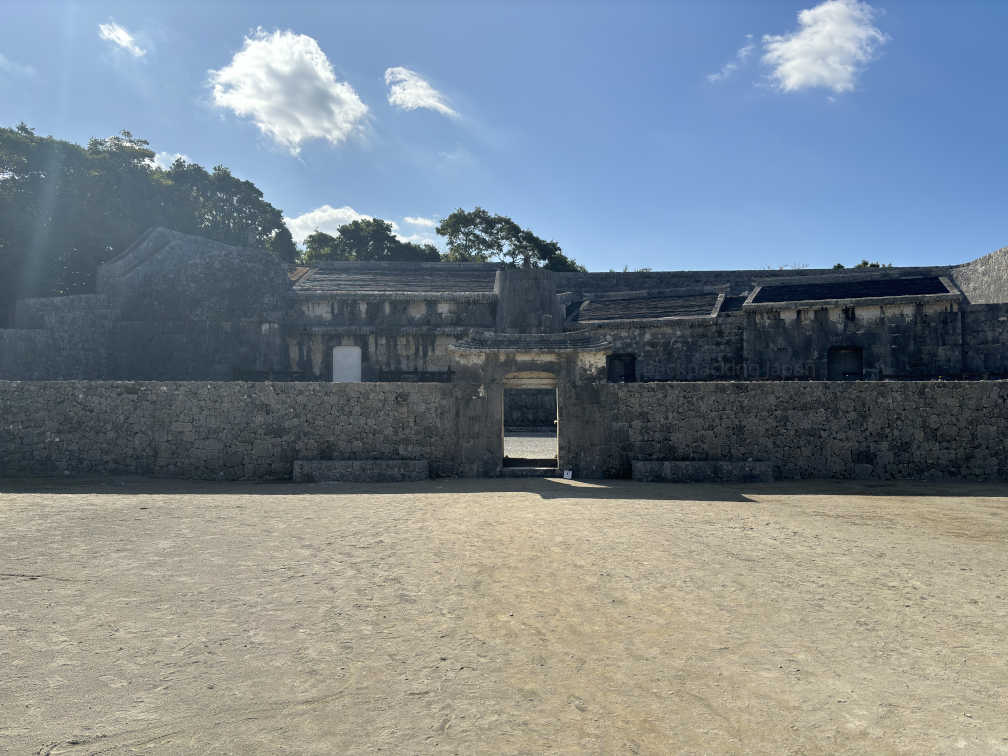
It was a little past 11 am and it would take nearly 30 minutes of a bus ride to go back to Kokusai Dori. It probably would have been possible to find a place nearby but I really wanted to try out the Aka Tombo which was closed the previous day. Heading to the bus stop, there was a really large amount of congestion. At first it seemed like it was moving but just very slowly. Upon reaching the bus stop, it took nearly 5 – 10 minutes before realizing that all the cars had completely stopped moving. What on earth could have been causing congestion worse than traffic in North America?
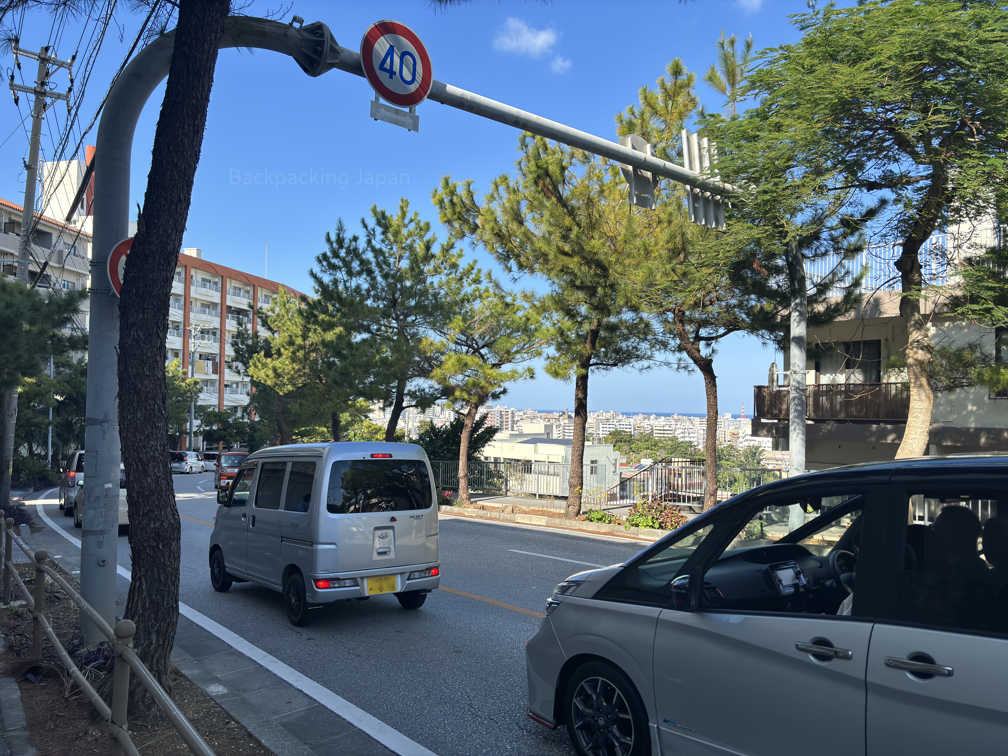
Realizing the bus wouldn’t be arriving given this much traffic, the best option was to walk the rest of the way. I ended up straying off the path a little to follow the cars just to find out what was causing the traffic. Lo and behold, it was a shrine which is mainly accessible by car as implied by the big car lineup and the moderately sized parking lot. Not everyone does Hatsumode on the 1st of January, so it spills over into other days of the month such as the 2nd.
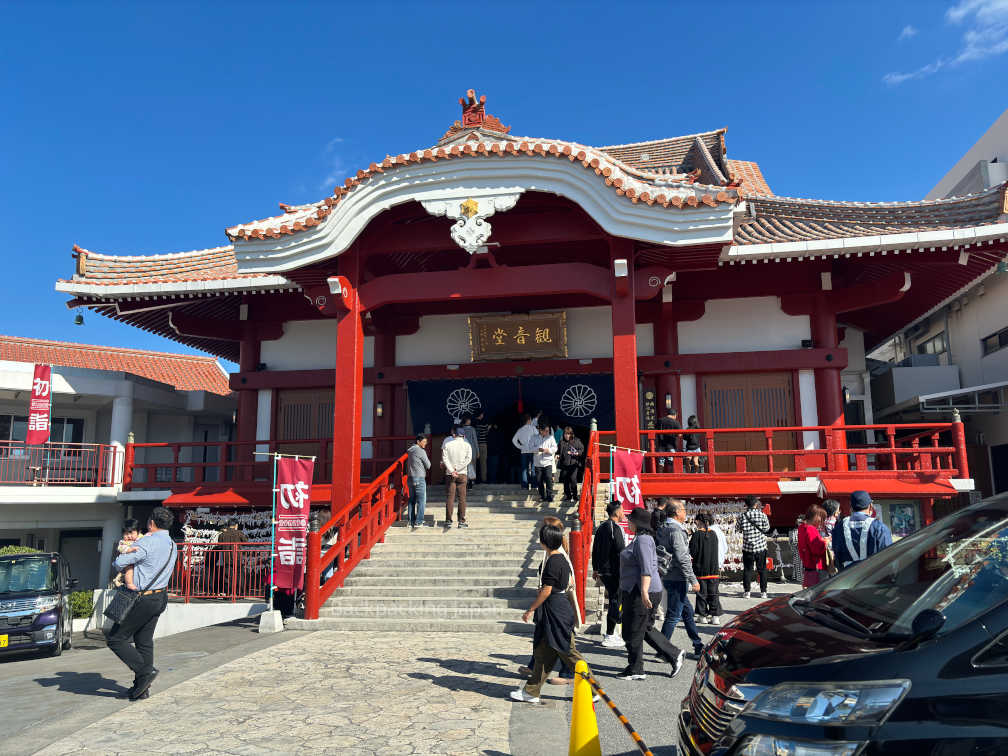
Same thing when heading away from the shrine, there was a huge lineup of cars.
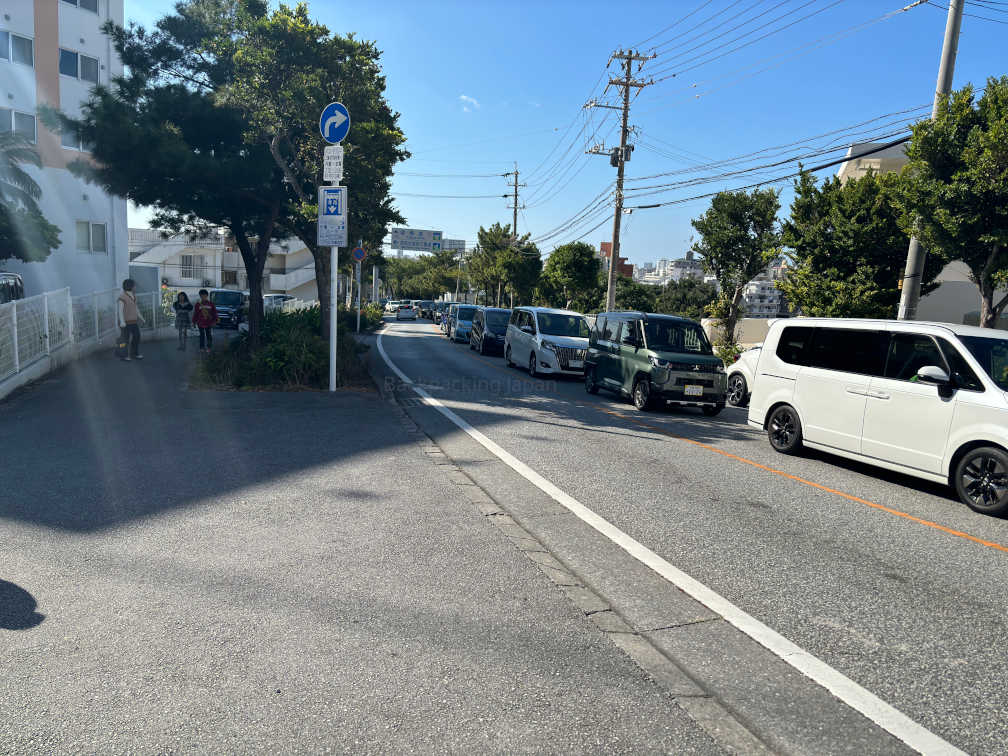
Okinawa is fairly known to be a place that’s best traveled with a car, so getting an international license was a large consideration as preparation for this trip. But mid-walk, the realization struck that renting a car and taking this path would’ve meant getting stuck in one of these traffic jams for who knows how long. If I were to visit Okinawa during New Year’s again, I’d definitely do my best to avoid renting a car. But sometimes a car is necessary depending on where you want to go, so doing some research in advance will go a long way to avoid getting caught in one of these deadlocks.
Arriving at Aka Tombo, the scene had unfortunately remained unchanged from the previous day. Still wanting to eat taco rice, the best option became finding a spot somewhere along Kokusai Dori. Having found a restaurant that serves taco rice, it had nearly reached 1:00 pm before finally getting to dig in! As a lesson learned, call restaurants in advance to see if they’re open instead of wasting time by traveling to find out they’re closed.
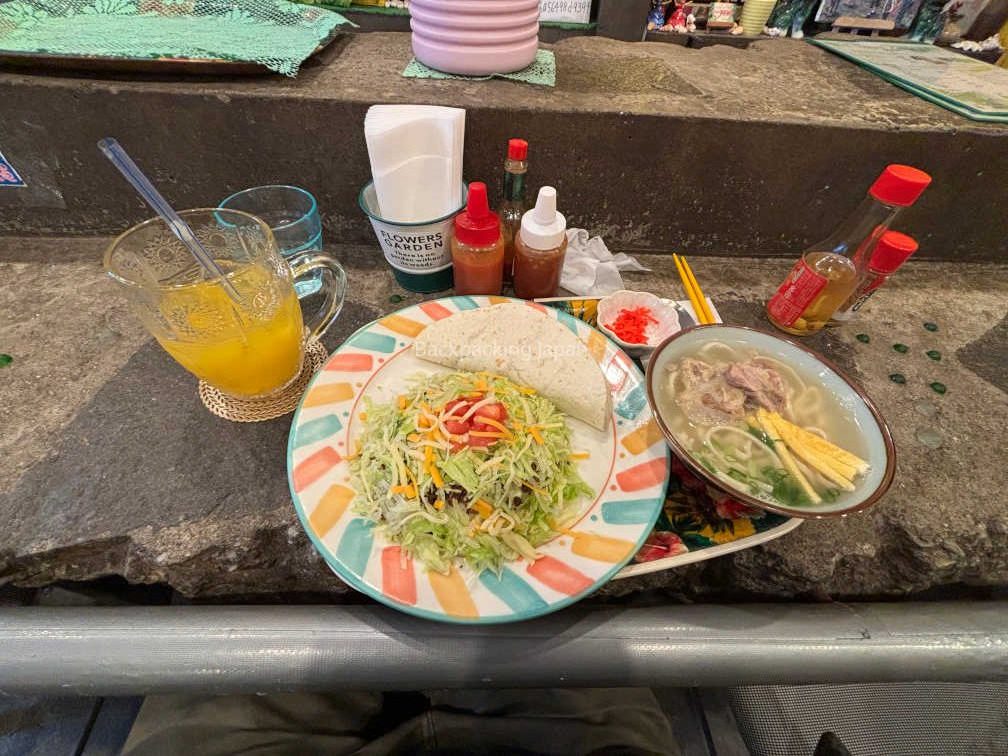
Unsure what to do after eating lunch, a quick look at Google Maps showed some green space a little out of the city that was near a monorail station. Upon zooming in, it was in part a castle ruin called Urasoe Castle Ruins. There was a fair amount of greenery and it was slightly hilly, but not very steep, making it a reasonably easy hike. In addition to the ruins, there’ll be views over the southern and central parts of the main island of Okinawa. Overall, it’s a nice place to spend an hour or so if you’re looking to get away from the city but have no access to a car and don’t want to be too far away from Naha.
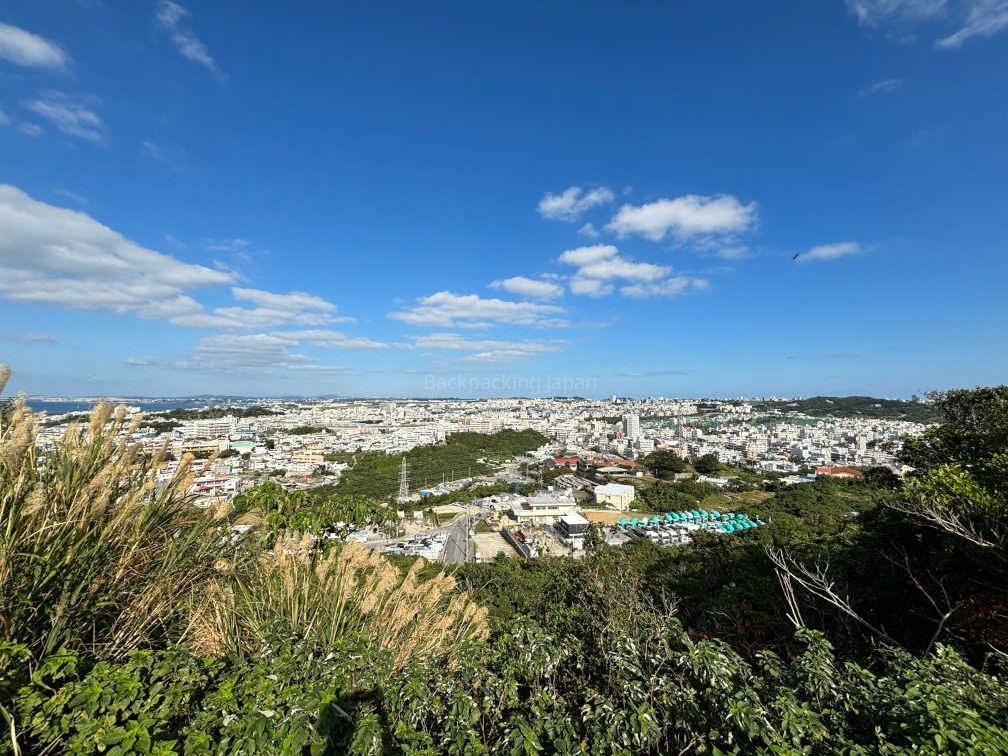
Between wanting to try more local foods and being curious about what businesses in the shopping arcades had opened up since the 1st, returning back to the Kokusai Dori area seemed like the best option. Doing so also meant being able to do some light shopping. But all the heat and walking had been very tiresome. So before all that, a quick ice cream stop at Blue Seal, an ice cream shop which is very prevalent in Okinawa which has ice cream in Okinawan flavors.
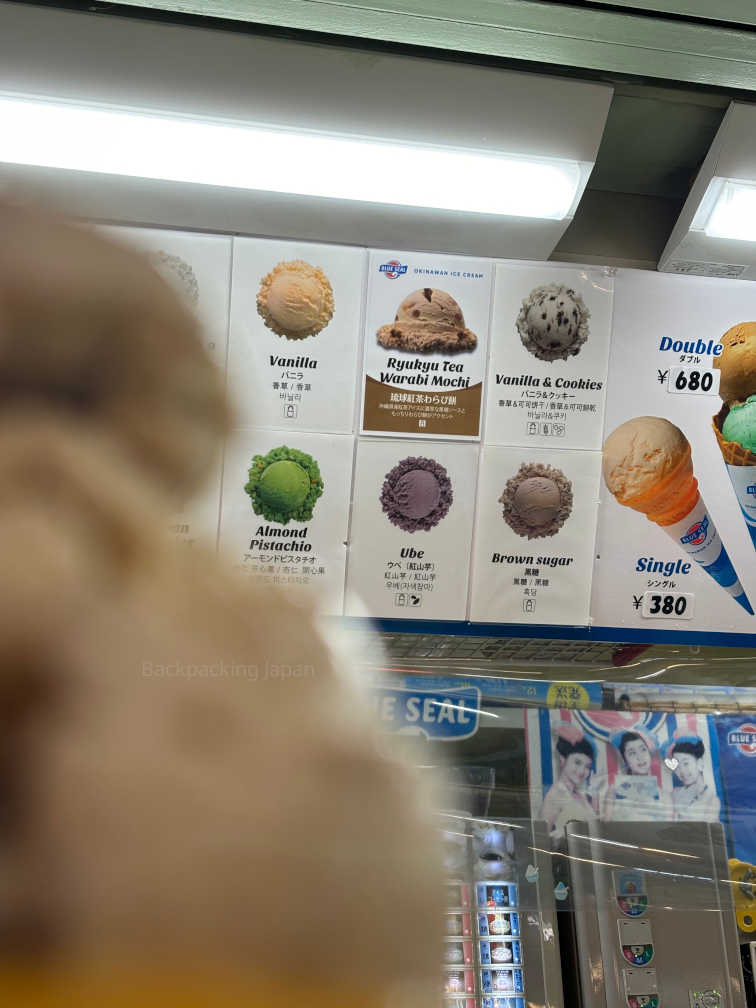
Following that, there was an Okinawan sweets store along Kokusai Dori which sold Chinsuko and Sata Andagi.
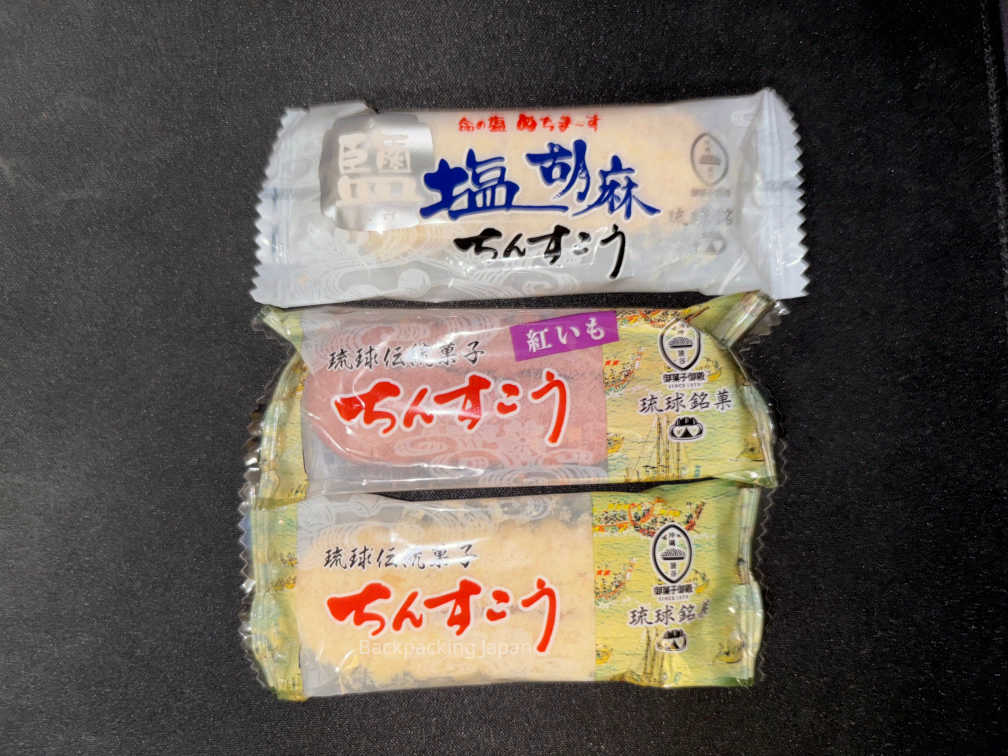
After walking for a bit and checking out the shopping arcades again, it seemed like there were definitely more stores that opened up, but not by a significant amount. Growing a little peckish from all the walking, it was time to stop by another Izakaya to try more local specialities – this time, Rafute.
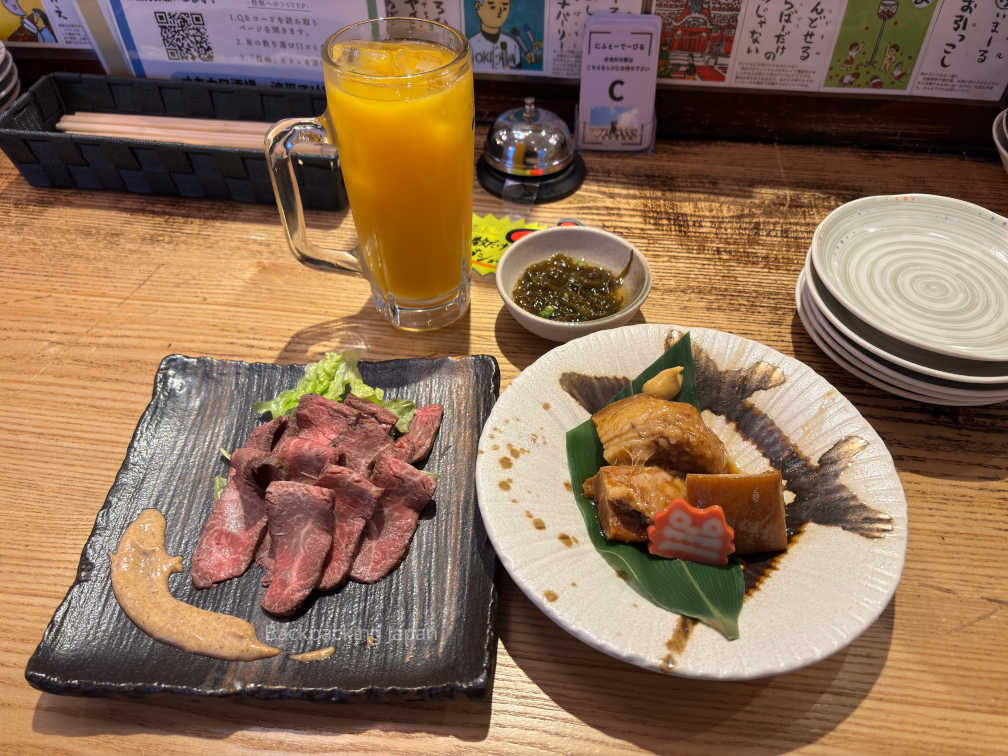
Upon leaving the Izakaya, the staff gave a Sata Andagi as a parting gift. They even chased after me as I left the building a bit faster than they anticipated! What a wonderful display of omotenashi (Japanese hospitality). It’s a moment that still lingers in memory as it was a really cute gesture.
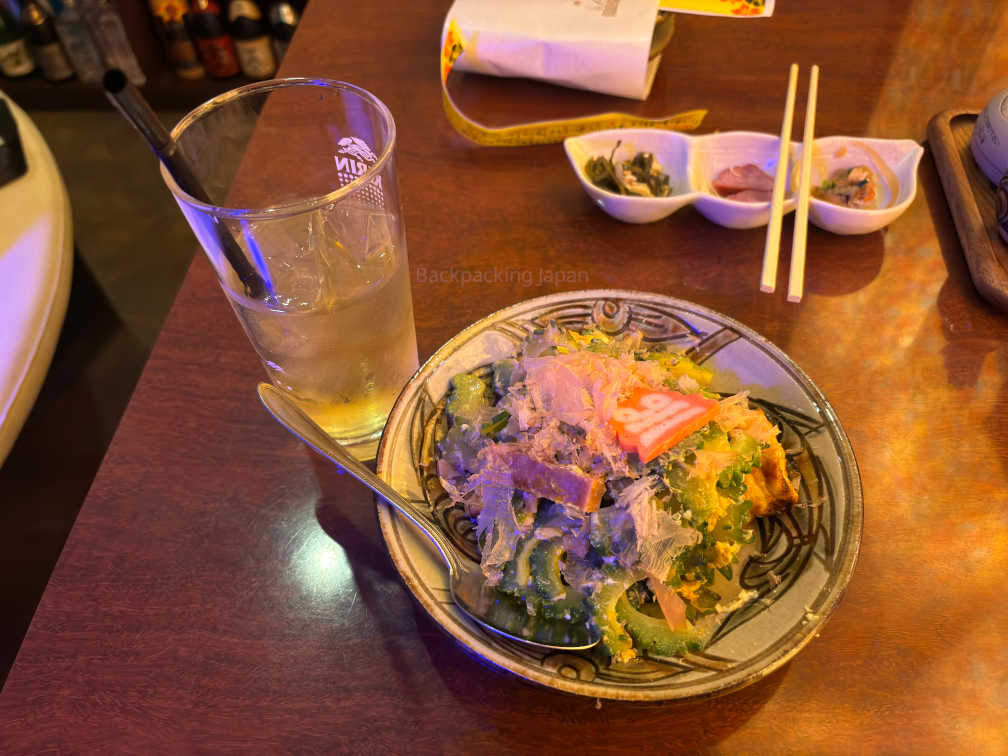
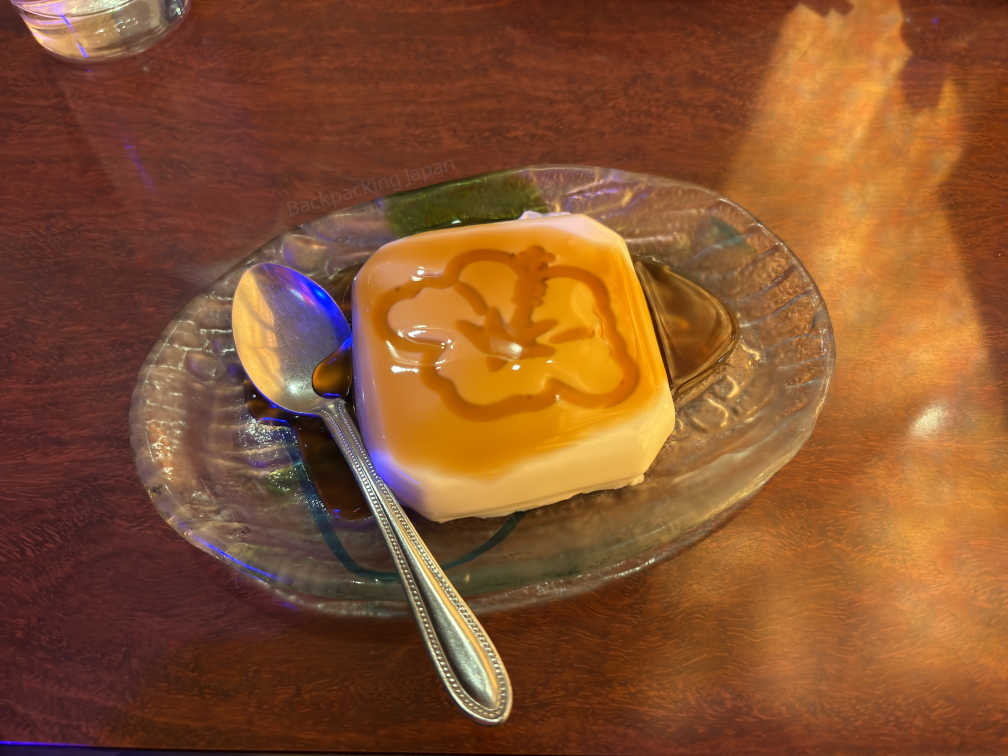
Walking a bit more, it soon reached the reservation time for dinner. Being the last meal in Okinawa, there were still more local specialties to try. However, the meal at the Izakaya and an apple (not mentioned above, but was eaten in between the Izakaya and the reservation) were still digesting. Still having a little space left, goya champuru and jimami dofu would be the last local dishes. As for the restaurant, it had its own charm as there was a sanshin player who went around playing (what I assume were) popular songs in Okinawa.
The flight to leave Okinawa would be early next morning (7:25 am). Returning back to the hotel, I called it another early night.
Leaving Okinawa
In order to give myself enough time to wake up and go to the airport, I set my alarm for 4:00 am and in hindsight this was another terrible decision. The goal was to arrive at the airport 2 hours early because it was still considered the new year’s holidays. The monorail wasn’t running this early in the morning so the only option was to take a taxi. Upon arrival, the airport wasn’t even open and wouldn’t open until 6:00 am. That meant having to stand around while hungry and having to shoulder a moderately heavy backpack set until it opened. It also turned out that the monorail has a train which arrives a few minutes after the airport opens so there was no need to even take the taxi to begin with! What a waste of 2,000 yen! Next time I’ll sleep in a bit more, eat breakfast before checking out, and take the monorail to save money. Thankfully the convenience stores inside the airport were open immediately, so I was able to buy a few Onigiri.
With that, my trip to Okinawa came to an end. In an hour or so, the plane would be arriving in Kagoshima and thus my day-to-day city-hopping journey would commence. Thanks for reading and I hope the lessons I learned are able to help you with planning or having a more enjoyable time in Naha!

Summary and Lessons Learned
Summary
Airport
Naha Airport is directly connected to Naha’s monorail. The monorail is accessible from floor 2; make sure to continue all the way outside, taking the footbridge until reaching the monorail station.
Monorail
The monorail supports payment by IC Card.
Hotel
Omoromachi is approximately 10 – 15 minutes away from Kokusai Dori by public transit, which may be slightly inconvenient. However, its proximity to the monorail line and the tranquility of the area are definite advantages.
Attractions
Kokusai Dori
Naha’s main shopping and entertainment street, lined with many restaurants, bars, and stores. Connected to it are the shopping arcades which have a variety of retail businesses.
Naminoue Shrine
One of Okinawa’s main shrines, it sits on a cliff which overlooks the ocean and neighboring beach. This shrine becomes extremely busy and crowded during the beginning of the new year’s (due to hatsumode), requiring a line-up that can take an hour or more of waiting.
Onoyama Park
A park in Naha next to the monorail line which has a number of shrines within the grounds. Expect the largest shrine of the park, Okino Shrine, to also be packed during the start of new year’s.
Tsuboya Yachimun Street
A quiet street with cobblestone roads, located not too far from Kokusai Dori. Lined along the street are primarily businesses that focus on pottery.
Fukushuen Garden
A tranquil garden that sits between Naminoue Shrine and Kokusai Dori. It features a waterfall and a lake over a rocky terrain. Payment is required for entry.
Shuri Castle
A former palace that is under reconstruction (Jan. 2024) due to a fire in 2019. There is a paid section which allows you to support and view the reconstruction project of the castle. The area outside of the castle walls is accessible for free and still has beautiful sights to see.
Tama-udun Tomb
Located right outside of the Shuri Castle grounds, Tama-udun is a resting place for the royal family of the Ryukyu Kingdom. An admission fee is required for entry and includes access to their museum.
Urasoe Castle Ruins
A great greenspace to visit when looking to make a brief escape from the city, located approximately 15 minutes from the Urasoe Maeda monorail station. The castle ruins and a mausoleum can be visited while there. A short hike may be required, but most beginners should have no difficulties.
Food
Okinawa Soba
A delicious regional noodle soup which uses thicker noodles more akin to ramen or udon than soba, but with a lighter soup base, closer to the soup used with soba or udon.
Pork Tamago Onigiri
Spam and egg wrapped with rice and seaweed, with the option of additional toppings such as umi budo. The store is open quite early in the morning, even on the 1st of January, which makes for an interesting breakfast.
Umi Budo (Sea grape seaweed)
A regional food which is seaweed that looks like a stalk of mini grapes. Each bite imparts a fresh, salty flavor reminiscent of the ocean it was taken from.
Jimami Dofu (Peanut Tofu)
A local dish which is like a pudding made with peanuts. The nutty flavor makes it a great dessert as well!
Yakisoba (Stir-fry Noodles)
A dish commonly found during (but not limited to) the new year’s at stalls set up near shrines.
Okinawa Zenzai
Okinawa’s variation of zenzai, a traditional red bean dessert soup. Instead of a soup, it’s shaved ice over red beans. A wonderful way to cool down!
Taco Rice
A delectable regional dish consisting of ground beef on rice, typically served with shredded cheese, lettuce, tomato, and salsa; it’s a taco which uses rice instead of a taco shell!
Blue Seal Ice Cream
An ice cream chain, very prevalent in Okinawa, which offers ice cream in Okinawan flavors.
Rafute (Pork Belly)
A savory local specialty consisting of braised pork belly which melts in the mouth.
Goya Chanpuru (Stir-fry Bitter Melon)
A local dish which is a stir-fry using goya bitter melon. It typically also includes tofu, luncheon meat, and sometimes egg and bean sprouts.
Lessons Learned
Hotel Location
Having spent most of the Okinawan side of the trip in Naha, one regret was having picked a hotel which was further out from the Kokusai Dori area. While it was slightly cheaper to have stayed in Omoromachi, the time-cost of having to go back and forth from Kokusai Dori to the hotel was not worth the extra money saved.
For those visiting Naha for just a few days, consider a hotel near Kokusai Dori. This area is a hub for activities and dining, offering convenience that can greatly enhance your travel experience.
Hatsumode (First Shrine Visit of the Year)
If you wake up early on the 1st of January (or even any of the following days), the first thing you may want to do is visit the shrines with the intent of arriving before the lines get extremely long. Having visited Naminuoe Shrine late in the morning, the line was already long enough to require nearly an hour of waiting before entering the shrine grounds.
Yachimun Pottery Promenade
Nearby the Tsuboya Yachimun Street is an aesthetic walkway which I had missed while there. If I could go back in time, I’d definitely visit this spot as I was right next to it and it seems like a wonderful photo spot.
Call Restaurants in Advance During Holidays
Same as the lesson in Tokyo, call restaurants or check their social media in advance during holidays. If you can’t determine whether they’re open, it’s safest to assume they’re closed. This will save you the trouble of traveling to a restaurant only to find it shuttered.
Make Reservations During Holiday Periods
If a restaurant will be open, it would be wise to secure a reservation. Restaurants-especially the sought-after or upscale ones)-can become fully booked out during the holidays. For exceedingly popular spots, consider reserving a table regardless of the time of year.
Visit Shuri Castle Early
By arriving early in the morning, it’s possible to dodge the crowds that gather later in the day. The early hours are quite empty, allowing for photos without other tourists in frame. For reference, I arrived around 9:30 am when it was mostly employees present. Just a little over an hour later, the front entrance was swarming with tourists.
Avoid Driving During New Year’s
Okinawa’s reliance on cars is notable compared to Japan’s main islands, and this extends to the areas around shrines. During the new year’s period, the roads leading up to shrines can become heavily congested. To avoid the stress of traffic jams, consider alternative transportation during this period, or research into routes that bypass shrine areas if you decide to drive.
Morning Flights from Naha Airport
For flights early in the morning (say 7:15 am), there’s no need to arrive at the airport 2 or more hours prior; Naha Airport opens at 6:00 am, so the earliest time to enter is a little over 1 hour in advance. The first monorail train also arrives soon after the airport opens, so it is likely the best option to get to the airport, especially if you stay near the monorail line.
